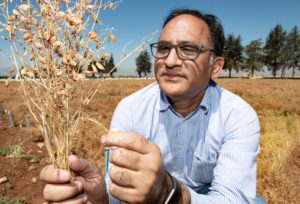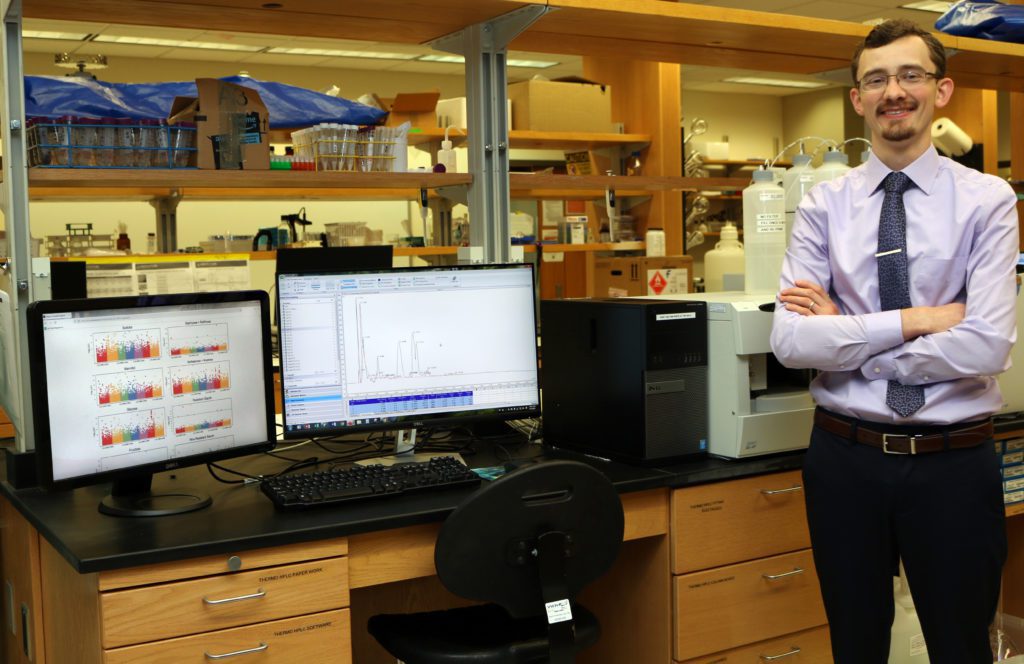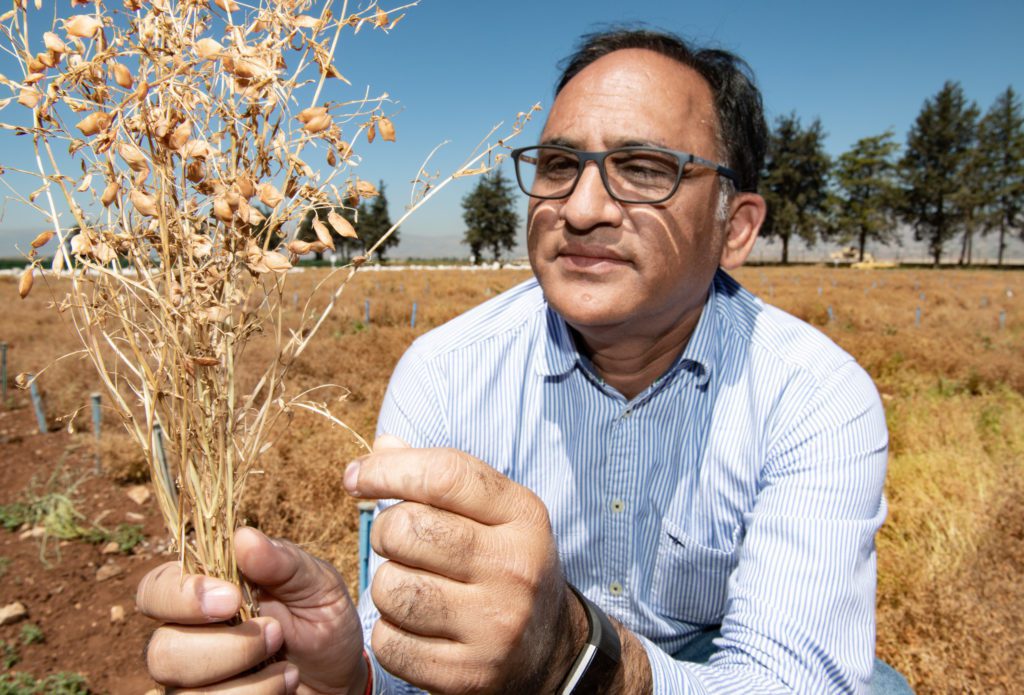Research related to this project will help develop lentil cultivars that, in the future, can be grown as a winter crop in South Carolina.
– Dil Thavarajah, Clemson associate professor
A Clemson University doctoral student has determined genetic markers that can be used to breed new varieties of lentils, a nutritious crop grown worldwide.
Lentils are cool-season pulse crops that belong to the legume family. Known as “poor man’s meat,” lentils are inexpensive to grow and an ideal crop for use in feeding low-income populations.
They also contain significant amounts of prebiotic carbohydrates – specialized fibers that help plants better tolerate cold and drought and also support healthy guts in humans.
Nathan Johnson of Grand Rapids, Minnesota, and a team of researchers are studying how to enhance these prebiotics to develop new lentil lines that can be grown in South Carolina. Based on this information, new plant lines can be bred to include or not include certain gene variants. He is focusing his graduate studies on identifying DNA regions associated with prebiotic concentrations in lentils.

“We have identified several significant genetic variants associated with these prebiotic carbohydrates,” said Johnson, who plans to be a medical doctor. “In the future, plant breeders will be able to use these genetic markers based on these findings to develop improved lentil varieties.”
In an article published in Scientific Reports, Johnson writes that prebiotic carbohydrates are important for helping lentils become resilient to climate change, as well as help increase global nutritional security. Prebiotic carbohydrates found in lentils are raffinose-family oligosaccharides (RFOs), fructooligosaccharides (FOSs), sugar alcohols (SAs) and resistant starch (RS). These prebiotics contribute to lentils’ health benefits.
“Beneficial microorganisms ferment prebiotic carbohydrates in the colon,” Johnson said. “Scientists have found that having a healthy colon rich in these types of bacteria is associated with improved health and prevention of non-communicable, or chronic diseases.”
In plants, these carbohydrates are important for transporting carbon, storing energy and protecting against drought, heat, cold, salinity and other stressors that can affect plant growth and productivity.
“Genome-wide mapping of prebiotic carbohydrates is important for creating new breeding lines that can withstand climate change and help provide global nutritional security,” he said.
Having more varieties can help make lentils available to more people. Pulse crops like lentils are high in protein and low in fat. They also are packed with folate, iron, phosphorus, potassium, selenium and manganese. Because they are nutritious and affordable, lentils are a staple food for many low-income populations.
A report from the National Center for Biotechnology Information (NCBI) shows obesity and malnutrition have become significant health burdens, with an estimated 34% of adults and 15% to 20% of children and adolescents in the United States considered obese. Most often, the cheapest foods contain high levels of fat and sugar. A majority of obese people are from low-income families who eat these foods.
To help ease this health burden, Dil Thavarajah, Clemson associate professor, said it is important to educate breeders on the importance of including nutrition quality traits in their pulse breeding programs. Through her organic pulse nutritional breeding program, Thavarajah seeks to increase important traits such as protein and carbohydrate quality to combat obesity and malnutrition.

“A diet rich in prebiotics and low in calories is important in combating obesity by changing gut (digestive) health,” Thavarajah said. “Research related to this project will help develop lentil cultivars that, in the future, can be grown as a winter crop in South Carolina.”
Two lentil mapping populations used in the study were obtained from ICARDA (International Centre for Agricultural Research in the Dry Areas) in Rabat, Morocco. The objectives of this study were to identify and quantify prebiotic carbohydrates, identify single nucleotide polymorphism (SNP) markers and candidate genes for lentil prebiotic carbohydrates and identify lentil prebiotic carbohydrate breeding targets for human nutrition and climate resilience.
In addition to Thavarajah, Johnson also is working with Lucas Boatwright, a Clemson Plant and Environmental Science Department research assistant professor; Stephen Kresovich, Clemson Robert and Lois Coker Trustees Endowed Chair of Genetics, and lentil breeder Shiv Kumar Agrawal who leads the ICARDA Food Legumes Program. Their research is supported by a grant from the United States Department of Agriculture’s Institutes of Food and Agriculture (USDA-NIFA).
High-tech research
Researchers use modern technology in this study. Boatwright is performing bioinformatics to sequence lentil varieties and develop computer programs and genetic resources for research. He is using Clemson’s Palmetto Cluster to process the lentil genetic data.

“I am using numerous bioinformatic programs to process these large-scale datasets,” Boatwright said. “This is necessary for both speed and scalability as these types of projects include hundreds of different Lentil varieties and thousands of genes.”
Boatwright and his team assist in identification of genes and development of resources for their own projects, as well as for the whole community of lentil researchers.
“That’s one of the major benefits of these projects,” he said. “The products of our research provide compounding benefits beyond the initial scope of the project. We will be using these data, along with our bioinformatic tools, to identify genomic regions or genes associated with enhanced nutrition and traits beneficial for organic breeding.
“Once identified, breeders can better select for higher quality varieties and potentially do so at an earlier developmental stage, which can further accelerate the development process.”
The Palmetto Cluster is Clemson’s primary high-performance computing (HPC) resource. It is a supercomputer used by researchers, students, faculty and staff from a broad range of disciplines for a wide-range of research needs.
Global collaboration
Working with ICARDA and Agrawal sets this study on the global stage. Agrawal has worked with national and international partners for more than three decades to develop new pulse crop and rice varieties. He works for ICARDA in Morocco, supervising student research and training national partners in legume improvement. He holds a doctorate in plant breeding from the Govind Ballabh Pant University of Agriculture and Technology in Pantnagar, India.
Agrawal said partnering with Clemson for this project can help produce new pulse crop varieties for the Earth’s changing climate.

Photo by Michael Major/Crop Trust
“ICARDA partnered with Clemson University in this project to provide access to global germplasm and improved breeding lines that are adapted to specific cropping systems and climate change,” Agrawal said. “Under this project, ICARDA also will help establish an efficient breeding pipeline for lentil and field pea. This collaboration will help deliver varieties that are adapted to specific cropping systems, climate change and organic farming.”
Lentil is one among the preferred crops for cultivation in rainfed dry areas where crops encounter frequent water and heat stresses of varying degrees at different growth stages. With rising temperature and unpredictable precipitation under climate change, water and heat stresses are expected not only to increase in intensity but also in frequency, causing 30-40% yield losses and having an adverse impact on nutritional qualities.
“In order to adapt to climate change and variability, climate-smart varieties are required to deliver better yields under these stresses,” Agrawal said. “To develop such varieties is possible as extensive screening of the global germplasm collection and wild relatives of lentil has resulted in identification of genes/QTLs (Quantitative Trait Loci) which are associated with traits allowing for tolerance to drought and heat stresses in lentil.”
Agrawal said consumers and farmers will benefit from new lentil varieties developed through this collaboration.
“New varieties of lentil are developed through conventional breeding methods using modern tools and techniques and are as safe as varieties currently grown by farmers,” he said. “An advantage these new varieties have is ability to adapt to a changing climate and help farmers harvest a good crop without significant yield penalty.
“The outcome of this project will contribute to strengthen the organic food market of lentils and field pea, and also bridge the demand-supply gap of plant-protein based food market.”
-END-
This research is supported by the USDA-National Institute of Food and Agriculture (USDA-NIFA) under grant number 2018-67014-27621. The content is solely the responsibility of the authors and does not necessarily represent official views of the National Institute of Food and Agriculture.
For more information, read Genome-wide association mapping of lentil (Lens culinaris Medikus) prebiotic carbohydrates toward improved human health and crop stress tolerance in Scientific Reports.
Related images and video
(Right click on images to download)






Get in touch and we will connect you with the author or another expert.
Or email us at news@clemson.edu

